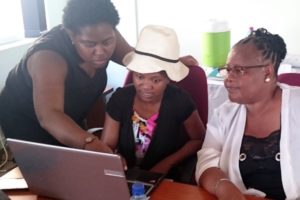
Left to right: Annastesia Mims, US Peace Corps volunteer; Phumaphi Mamba, educator for CANASWA; Dumsile Mavuso, founder and director of Diabetes Swaziland
Our partners at Good Shepherd Hospital in Swaziland are using digital storytelling to improve awareness and education about non-communicable diseases (NCDs).
Working closely with the newly-formed Swaziland NCD Stakeholders Alliance, COMDIS-HSD is supporting a project to develop digital storytelling as a low-cost, effective way to educate patients and health professionals.
Our COMDIS-HSD partners are capacity-building across the Alliance’s 12 member organisations. The team is coaching healthcare advocacy staff on the use of video, pictures, voice and music to tell real life stories of patients who live with illnesses such as diabetes, hypertension, cardiovascular disease and mental illness.
Importantly, the workshop focused on low-tech solutions using photos, short video clips, basic audio and PowerPoint rather than expensive camera equipment and editing software.
As well as educating communities about NCDs, participants learned how stories can play an important part in counselling and reassuring newly-diagnosed patients. They can also be powerful tools in persuading fundraisers and stakeholders to invest in prevention and support for these conditions.
According to Annastesia Mims, Peace Corps volunteer working with our COMDIS-HSD team to lead the project, digital storytelling could have particular resonance in-country:
‘In Swaziland the use of digital storytelling is emerging but there is room for greater work. We have a large number of people that can be seen as expert patients; those that have been diagnosed with certain conditions but show a positive manner in the way they handle it.
‘A story can depict a message of hope and perseverance and this is something that the Swazi people can relate to.’
The one-day workshop covered the key principles of digital storytelling, reminding participants that stories should be short, honest, personal and focused.
Participants also learned about the practical process of developing their stories, including the use of ‘story circles’ to help patients and carers share their experiences in a supportive, non-judgemental environment before moving onto scriptwriting and storyboard stages.
One participant said: ‘The workshop has outlined the effectiveness of digital storytelling and it has filled the capacity gap we have as organisations to move into collecting patient stories.’
Another participant added: ‘Although digital storytelling is something new for me, it is one of the best ways of reaching our communities.’
See some of the detailed resources shared at the workshop on our website:
The work is part of our wider study to decentralise NCD treatment, particularly for diabetes and hypertension, from Good Shepherd Hospital to a network of community clinics. While there are still issues to address, such as drug availability and the provision of doctor-led outreach care, the study is showing encouraging preliminary results with clinics coping well with decentralisation.

